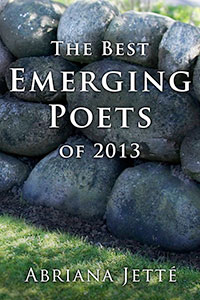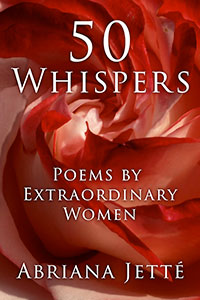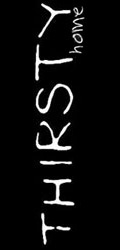

By Abriana Jetté
Staten Island, NY, USA

Abriana Jetté
There is poetry for pleasure, and there is nothing wrong with poetry for pleasure. The leisure with which one may escape into the rhythms of verse, or "the courses of / prancing poetry" as Emily Dickinson called it, offers a respite unlike any other. But today's poetry has little time for pleasure. Today's poetry bears the weight of telling, of revealing, and of criticizing our external and internal worlds for the sake of memory. Memory: that fickle, delicate sine qua non of our existence.
I would be lying if I said I did not gain some type of pleasure from writing poetry and writing about poetry. It is the rush of language, the effervescence of letters, which fuels me so. But I would also be lying to you if I did not admit that my desire to document through words directly corresponds to my desire to remember. That thing, it happened. More so, it mattered.
The poets I want you to read this Spring have reminded me of what it means to write poetry, and why. They are poets who reflect; they document history. They recount their grief, fears, and ordinary experiences so intimately the hair on our own arms stands up. And through their memories they prophesize. That's the thing about really good poetry, it knows before we do. This Spring, I want you to remember our shared histories and responsibilities through the poetry of Hila Ratzabi, Kerri French, and Jenna Le.
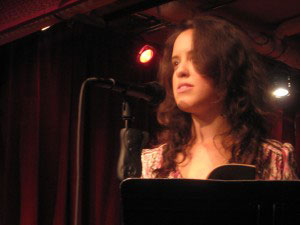
Hila Ratzabi
Much of Hila Ratzabi's work confronts the hideous truth about our time on Earth; that is, it explores the consequences of how we communicate with other human beings, species, and the natural world. Specifically, her "Sedna" poems incorporate legends of yesteryear with visions of the future.
Believed to live in the darkest depths of the Arctic Ocean, history has nicknamed Sedna, the Inuit Goddess of the sea, everything from "the Big Bad Girl" to the "Mother of the Deep", and Ratzabi is diligent in representing the many interpretations of the Goddess's personality. In "Sedna the Arctic Sea Goddess" and "Sedna in Space", the myth and treatment of Sedna becomes analogous to the contemporary female struggle. Written in couplets, "Sedna the Arctic Sea Goddess" explores the early life of the Goddess, sharing the fact that no matter who is telling the story, Sedna's father is responsible for throwing her away to sea and cutting off her fingers when she clings to "his kayak", "one by one", until she drowns. The speaker interjects her own tale to say:
"Only a man's goddess would lose use of her hands."
There is a clear distinction between the men and the women in the Sedna poems. The men, who "fashioned their bitch goddess into a fat girl", appear angry, jealous, and bitter. In fact, their lives seem dedicated to finding the perfect place in which to stick the powerful Sedna, a place far away from them.
"Now you're nothing"
begins "Sedna in Space", a poem that positions itself out of this world, literally. Discovered in 2003, the Sedna of the title does not dwell at the bottom of the sea, rather at the farthest, darkest, "coldest most distant place known in the solar system", according to the astronomer Michael Brown, who discovered the planet with two colleagues over ten years ago. The first stanza of the poem reads:
"Now you're nothing
but a dwarf planet at the edge
of the asteroid formerly known as Pluto"
If Sedna's ferocious folklore, her ability to refuse her fish to the fisherman or form freezing, tumultuous hurricanes, induced fear for readers, her demise to an even colder, more lonely home is enough to twist our stomachs with pity. It's enough to make the speaker of the poem "want to place a blanket / around [her] shivering surface." A sense of lonely regret permeates "Sedna in Space", especially as the speaker recounts how, on her homeland:
"we've released
so much heat into the sky
it's burning us back."
For every action, a reaction. What we do to the land, to the air, to the sea, will be done back to us. Ratzabi takes up this concern more directly in "Google Earth", a poem that lives in the same extraterrestrial landscape as "Sedna in Space."
The initial omniscience with which "Google Earth" begins, the landscape "cut in rectangles of green", our view from above, is interrupted by the fact that
"On the ground, roofs keep us
from looking up."
What works so well in these lines is the fact that Ratzabi chooses to turn to a man-made distraction, rather than the clouds or some other ethereal interference. The roofs over our heads, the homes that keep us warm, our present every-day palpable and understandable comfort is what prevents us from seeing the truth. We are responsible, so we burn. We are the only ones to blame for not looking hard enough whenever we look up. The poem continues with a chilling prophecy:
"One day there will be no rain.
One day we'll be able to google earth
from somewhere else."
Throughout Ratzabi's work there is a concern with the state of our planet, and she addresses these concerns in ways that interject multi-cultural mythologies, connecting the narratives of evolution, from Sedna to the 2012 Mayan speculation of the end of the world. Whether she is driving over the Tappan Zee Bridge or reflecting on folktales, Hila Ratzabi ensures the voice of her poetry is politically and socially engaged.
Hila Ratzabi was selected by Adrienne Rich as a recipient of a National Writers Union Poetry Prize and has been nominated for a Pushcart Prize. She is the author of the chapbook The Apparatus of Visible Things (Finishing Line Press). Her poetry is published or forthcoming in Narrative, Alaska Quarterly Review, Drunken Boat, The Adroit Journal, Linebreak, The Nervous Breakdown, Leveler, H_NGM_N, Cortland Review, and others. Her poems appear or are forthcoming in the anthologies Ghost Fishing: An Eco-Justice Poetry Anthology and The Bloomsbury Anthology of Contemporary Jewish American Poetry. She holds an M.F.A from Sarah Lawrence College, and lives in Philadelphia where she founded the Red Sofa Salon & Poetry Workshop. She is the Editor-in-Chief of Storyscape.
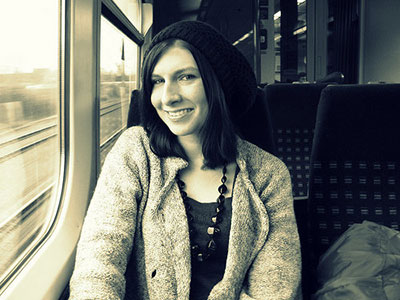
Kerri French
History comes in all shapes and sizes. History is everything from the "Big Bad Woman" who lives in the bottom of the Arctic Sea to the word of mouth that spread the message of David Bowie's death. Especially concerning American youth, history is made of the celebrity. Glamorous, rich, untouchable, the concept of the celebrity forms the perfect metaphor for the binary, the two-sided coin; the celebrity reveals all that is and all that never should be. Kerri French's "Amy Winehouse" poems, which appear in her chapbook. Instruments of Summer (Dancing Girl Press), expose the glorification of materialism in the media and the normalization of the tragedy in popular culture. When we look back on the first sixteen years of the second millennial A.D., what will we remember by? At least through poetry, we hope, we have offered something worthwhile on which to reflect.
The speaker's life in Instruments of Summer often coincides with the life of the late singer. "Amy Winehouse Admitted to Hospital Following Seizure" begins:
"So I plant clothes in the garden,
bury dishes beneath the dirt"
These are not the things we are supposed to put in the earth. The rest of the poem follows with such absurdity: the material world isn't as it should be. Distortion overwhelms the short poem, composed of six, two-line stanzas. In fact, its form directly opposes its content. The poem's structure is short, succinct; the content, wild and endless. Time ticks within the lines on the "Twenty-eighth of July." "All evening", "five, six", and then "half past eight." In the poem, everything has its limit and melts together in connective worry. "Tulips like candles" trace "the wrist." Even the flowers burn.
Poetry investigates personal truths until the memory becomes more than just a memory but a relived experience through language. French's poems investigate individual ethics and idiosyncrasies through a youthful perspective, one that thrives in energy, passion, with a voice that is direct and unapologetic. The idea of perspective permeates her work; at some moments readers are voyeurs, while at other times they quickly spot the speaker's intentions.
Take "Daytime Television, Late Night Sex", which allows the readers to be both know and observe. From the poem's title, readers anticipate drama, sex, a bed, unmade, somewhere, messy and hot, in the lines of the poem. While we anticipate these elements, we wait patiently, watching, hoping for the language to thrill us.
The poem begins as any soap opera scene might; "no need for knobs or remotes, electricity" only lives "in the spaces" the speaker and her lover touch. As the speaker marks the choreography of the lovers, readers are given glimpses of the body: "hidden parts" shown "in flashbacks between the sheets", the "best angles / wrapping each other", just as they would in the movies. No rolls of stomach fat catching the eye. No sweat sticking unattractively from cheek to cheek.
But, just as television history has taught us, things are often not as they seem. The onscreen family falters behind the camera lens. What we see is a façade, and at times a flat out lie. The television romance does not expose the "clumsy reaching for bra, / the long rip of a zipper", or any practical portrayal of two bodies, steaming for the other. The poem juxtaposes unrealistic fantasies perpetuated by movies, film, and of course, daytime television, alongside realistic expectations of human interactions, to comment on the absurdity of navigating the contemporary dating world and the severely misconstrued societal expectations of an unattainable beauty and love.
"Daytime Television, Late Night Sex" ends by shifting the blame for these expectations on the speaker's on self, resulting in an enchanting individual culpability. Whether she is identifying herself with a paparazzi-hound, addicted songstress or imagining what it might be like to be the star of a Daytime drama, French ensures the voice of her poems tests traditional standards. In its evocation of popular culture, her poetry reminds us of distinguishing between the trivial and the imperative.
Kerri French's poetry has appeared in Barrow Street, Mid-American Review, storySouth, DIAGRAM, Waccamaw, Lumina, PANK, Best New Poets, and The Southern Poetry Anthology, among others. A recipient of the Larry Franklin and Mei Kwong Fellowship from the Writers' Room of Boston, she holds degrees from UNC-Chapel Hill, UNC-Greensboro, and Boston University. A North Carolina native, she has lived in Georgia, Massachusetts, Tennessee, and England. She lives and writes outside of Nashville, Tennessee.
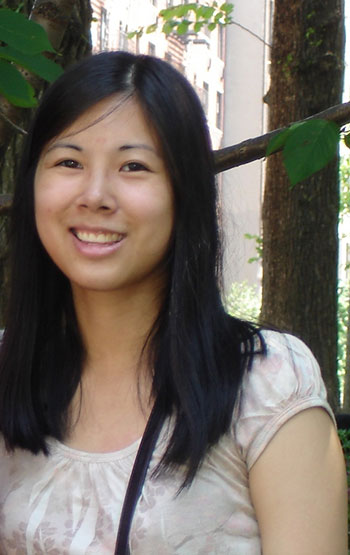
Jenna Le
The trajectory of Jenna Le's poetic range spans across many of the themes I've already discussed, from father-daughter relationships, to mankind's relationship to the physical world, to the imaginative and at times destructive influence of the television. In her poem "My Imaginary Life as a Narcoleptic", the speaker describes how, as a young child, she had "seen on Dateline NBC one night…./…a piece concerning neurologic oddities" including a "fat single guy" who "fell to snoring instantly" if and when any "strong emotions squirmed inside him." The man becomes a subject of inquiry for the speaker's seven-year old brain.
The poem continues to detail how the speaker imagined her life as a "twenty-something" narcolepsy patient / with movie actress cheekbones." She meets her lover John when she falls into a deep slumber whilst crossing a busy street. They live happily ever after until, inevitably in the scheme of the poem, another man steals the speaker's affection. A fight brews. The speaker's "knees buckle / and instantly" she falls asleep. Rather than leaving John, she is bound to him. So, as the speaker says: "narcolepsy keeps us together shackled." While this may appear to a modern day reader bizarre, perhaps even masochistic, it is quite alright, for "At seven years old", the speaker admits: "that's what I thought love was."
Beneath the dramatic narrative of "My Imaginary Life as a Narcoleptic" rests the undeniable truth that we have fallen asleep at the wheel, so to speak, in our understanding of love. The fact that what we see on the television effects the way we perceive the real world is undeniable, and unless we begin to portray love as a hard-working endeavor, one that demands respect and understanding, rather than sex and violent passion, seven year olds will continue to live under the wrong impression. As the old saying goes, "children learn what they see."
"Exodus", which reads as an opus of origin, also makes use of the speaker as child-seer. Written in four parts, Le plays with the idea of literary genre, breaking down the story through the lens of the Romantics, Realists, Modernists, and Postmodernists. At times hilarious, at other times absurdly sad, "Exodus" speaks to the immigrant experience and the associations and misconceptions that come with it.
The setting of each section varies. At times the family migrates in a spaceship, in other genre-specific moments they find themselves on a boat or situated directly in New York City. Wherever they are, they appear as a family unit throughout every re-telling. Even in the "Postmodernist Version", the last section of the poem, in which the first line reads "This is a story with no characters", the father and mother appear, at the mention of "the waterfall in Albuquerque", the "heartland town where they now live and work." Mom and Dad are inescapable; their stories are bound to the speaker's memory.
The language in "Exodus" is playful, changing on cue depending on which literary genre Le evokes. Perhaps her dynamic range of voice is one of her most successful skills. Even in a poem that retells the same story, nothing sounds the same. Though the speaker offers equal attention to the father, mother, and speaker, Dad reads as the most compelling for this reader, appearing overly eager to get to their final destination and press restart on their lives.
A similar character appears in "Trick", a poem that directs its attention whole-heartedly to the immigrant experience. It begins:
"America, you're
the Halloween costume
my immigrant father
rented and never returned."
Channeling the rhythms of Allen Ginsberg's "America", "Trick" tackles the difficulty of feeling foreign in a place one must call home. The poem utilizes the rich metaphor of the popular Halloween idiom "Trick or Treat" alongside Dad's eagerness to get ahead in his new homeland. Throughout the poem, we sympathize for Dad, who craves the treat so badly, but only gets tricked.
The father in the poem deeply yearns to feel connected to the American culture, so much so that he "clambered inside" the "baggy interior" wanting his share of "the season's sweet treats." The descriptions of the "baggy interior" appeals to the every-day blue-collar-and-blue-jean work uniform; one that has room within it to move. It is easy to empathize with Dad's desires, his need to better himself through an economic stand-point for the sake of his family, but it is the speaker's observations and tonalities which read most interestingly to me. Throughout the poem, the immigrant father and the American Dad blend together until one disguises the other. It is not clear if the "reptilian tale" is a costume or part of Dad's real identity, and purposefully so.
When we learn that Dad seduces the "starry-eyed mother / behind a tall hedge", dressed up as the man he never was, not-so subliminal messages of the financial world, and the fascination with wealth, crystallize. By the end of the poem, Dad can't keep up with unrealistic societal standards. His disguise is running up, the "costume shop / is demanding" his return. They call "the house daily / ringing the phone off its hook." To play the American game is to pay the American way. Throughout her work, she transforms every day, universal symbols, like the phone ringing off of its hook, so that come to life, speaking for both the immigrant and native experience.
The best poetry, as Wallace Steven put it, reminds us of "what we felt at what we saw." Jenna Le's poetry does just this. Le's poetry gives as much attention and focus to the dormant and ordinary as it does to the energetic and foreign. Her voice never reads one-sided, which creates a collective urgency of telling and remembering throughout her work.
Minnesota-born Vietnamese-American Jenna Le has a B.A. in mathematics and an M.D. She is the author of Six Rivers (NYQ Books, 2011) and A History of the Cetacean American Diaspora (from Anchor & Plume Press). Her poetry, fiction, essays, criticism, and translations appear or are forthcoming in AGNI Online, Bellevue Literary Review, The Best of the Raintown Review, The Los Angeles Review, Massachusetts Review, The Village Voice, and elsewhere.
Links:
Hila Ratzabi
Kerri French
Jenna Le
Abriana Jetté at Stay Thirsty Publishing
Abriana Jetté


